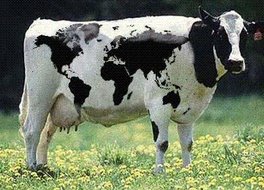Tuesday, February 26, 2008
You should read/listen to this
This week, NPR's series Climate Connections is focusing on the effect of global warming on disease spread. Yesterday was an interview with epidemiologists on the ground in the Amazon, today was a review of a book on yellow fever, which I reviewed here. I recommend checking out this series -- it does a spot-on job of covering some of the big issues involved, so far. We'll see what tomorrow adds.
Sunday, February 10, 2008
A response to the meat industry, minus the shrillness
I've been meaning to write about this article for some time now, but I've been too busy to do it properly. Even now, it'll be brief.
The idea is that we, as Americans, eat too much meat. I would have to agree. You could say we're biased, the author and I: he wrote a vegetarian cookbook, I was a vegetarian for a few years. Still, my experience is that little or no meat in my diet makes me healthier. His research shows that Americans are eating twice as much protein (mostly animal-based) as the (high-end) recommendation. I think we have an argument.
The environmental issue is a touchy one, but he makes his point well -- we produce far too much manure in concentrated areas to spread on fields (some dairy farms are now leasing fields just to spread their manure). We use a lot of water and energy growing and transporting grain to feed livestock. It's not true that all meat production should be banned; there are places in this world, as mentioned in the article, where grass-fed livestock is the only agricultural option. I've been to a couple of those places and believe me, you wouldn't want to be a vegetarian there! We shouldn't deny people a chance to raise their own food, no matter what the moral guilt of a rich society tells us we should do.
And that's really the point -- we, as citizens of a rich country with a wide range of food options, shouldn't be eating so much meat. What should we be eating? To quote another NYT columnist, "eat food, not too much, mostly plants."
The idea is that we, as Americans, eat too much meat. I would have to agree. You could say we're biased, the author and I: he wrote a vegetarian cookbook, I was a vegetarian for a few years. Still, my experience is that little or no meat in my diet makes me healthier. His research shows that Americans are eating twice as much protein (mostly animal-based) as the (high-end) recommendation. I think we have an argument.
The environmental issue is a touchy one, but he makes his point well -- we produce far too much manure in concentrated areas to spread on fields (some dairy farms are now leasing fields just to spread their manure). We use a lot of water and energy growing and transporting grain to feed livestock. It's not true that all meat production should be banned; there are places in this world, as mentioned in the article, where grass-fed livestock is the only agricultural option. I've been to a couple of those places and believe me, you wouldn't want to be a vegetarian there! We shouldn't deny people a chance to raise their own food, no matter what the moral guilt of a rich society tells us we should do.
And that's really the point -- we, as citizens of a rich country with a wide range of food options, shouldn't be eating so much meat. What should we be eating? To quote another NYT columnist, "eat food, not too much, mostly plants."
Tuesday, February 05, 2008
International Agents of Food Safety
This seems to be a good idea: if we're going to import food from overseas, we should put it through an equivalent inspection requirement.
I'll admit -- I like this idea, in part, because it will drive up the price for internationally sourced foods, much closer to local foods, which might give people another reason to support their local farmers!
I'll admit -- I like this idea, in part, because it will drive up the price for internationally sourced foods, much closer to local foods, which might give people another reason to support their local farmers!
Imagining a theory
Quick update on the cloned-animals-as-food issue: this article contains a scary quote from an FDA scientist.
I hope our FDA guys will start improving their imaginations, fast.
It is beyond our imagination to even have a theory for why the food is unsafe.Wow. They can't even imagine a theory. Umm, I don't want the people responsible for protecting our food supply (which mostly consists of imagining threats and counteracting them) unable to imagine a theory here. I can think of a few theories. Not good ones, of course, but he didn't say credible theory -- he said they couldn't imagine a theory.
I hope our FDA guys will start improving their imaginations, fast.
Subscribe to:
Comments (Atom)
